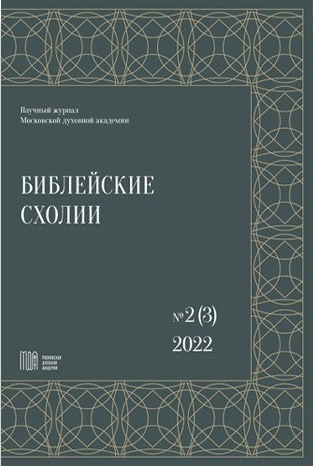The Linguistic Paradox of Self-Designation of the Phrase Ps. 127, 2 «τοὺς πóνους τῶν καρπῶν σου φάγεσαι» in the Daughter Versions of Septuagint
DOI:
https://doi.org/10.31802/BSCH.2022.3.2.011Keywords:
Phytomorphic metaphor, Daughter Versions of the Septuagint, addressee of Ps. 127, 2 (LXX), Sacrament of Marriage, καρπόςAbstract
The article presents a search for causes that prompted the authors of the Daughter Versions of Ps. 127, 2 (LXX) τοὺς πóνους τῶν καρπῶν σου φάγεσαι to the deliberate creation of the phrase «the labors of your fruits you will eat», where ambiguity is preferred over evidence. Interpretations of Ps. 127, 2 (LXX) Origen and St. Theodore of Cyrsky gives reason to believe that the Daughter Versions are an example of fixing the metaphor of the ancient Greek original, where in the context of Ps. 127, 2 (LXX) the lexeme καρπός is simultaneously interpreted as «hand» and «fruit». The resulting image of a fertile olive tree, the root of which is likened to the addressee of Ps. 127, 2, intersects with the future image of perfect Israel as a fruitful olive tree in Hos. 14, 6–8 (LXX). In Christian exegesis, Ps. 127 Greek and Latin authors repeatedly refer to the words of the prophet Hosea, including the passage Hos. 14, 6–8, where in the form of the root of the olive tree the prophet Hosea represents the forefathers and prophets of Israel. Orthodox marriage prayers of Byzantine origin can be considered in line with the ancient church Christian exegesis of Psalm 127, 2 (LXX), the addressee of which is called not only the forefathers of Israel, but also the Lord Jesus Christ.
Downloads
References
Псалтирь // ГСБ. ТСЛ. № 51 (870). [Рукоп. XVI в.]
Augustinus. Enarrationes in psalmos 119–133 / ed. Franco Gori. Wien: Osterreichischen Akademie der Wissenschaften, 2001. (CSEL; Bd. XCV/3).
Hieronymus. Tractatus sive homiliae in psalmos. In Marci evangelium. Alia varia argumenta / ed. G. Morin, B. Capelle, J. Fraipont. Turnhout: Brepols Publishers, 1958. (CCSL; vol. 78).
Hilarius Pictaviensis. Tractatus super Psalmos / ed. by A. Zingerle. Vienna: F. Tempsky, 1891. (CSEL; Bd. XXII).
Origenes. Selecta in Psalmos // PG. T. 12. Col. 1053–1686.
Theodoretus Cyrensis. Interpretatio in Psalmos // PG. T. 80. Col. 857–1998.
ორბელიანი სულხან-საბა. ქართული ენის განმარტებითი ლექსიკონი, რედ. იორდანიშვილი. ტ. I. 1949. [Орбелиани С.-С. Толковый словарь грузинского языка под ред. С. Г. Иорданишвили. Т. I. Тбилиси: Академия наук Грузинской ССР, 1949].
ლოცვა წიგნი და ფსალტერი. სოფელ დიღომში წმინდა მარინას სახელობის ეკლესია. 2004. [Молитвослов и Псалтирь. Тбилиси: Церковь св. Марины в с. Дигоми, 2004].
Дидим Слепец. На Книгу Бытия (Бытие. 16, 2) // Библейские комментарии отцов Церкви и других авторов I–VIII веков. Ветхий Завет. Том II: Книга Бытия 12–50 / под ред. М. Шеридана. Тверь: Герменевтика, 2005. С. 53–58.
Евхологий Барберини гр. 336 / изд., предисл. и примеч. Е. Велковской, С. Паренти; пер. с итал. С. Голованова; ред. рус. пер. Е. Велковской, М. Живовой. Омск: Голованов, 2011.
Ефрем Сирин, прп. Толкование на Четвероевангелие. М.: Сибирская благозвонница, 2011.
Иероним Стридонский, блж. Толкование на книги пророков Даниила, Осии, Иоиля. [Электронный ресурс]. URL: https://azbyka.ru/otechnik/Ieronim_Stridonskij/tolkovanie -naknigi-prorokov-daniila-osii-ioilja/2_20 (дата обращения 29.10.2021).
Псалтирь с объяснением каждого стиха блж. Феодорита, еп. Кирского. М.: Братство во имя Святой Троицы, 2011.
Псалтирь учебная / пер. Е. Н. Бируковой, И. И. Бирукова М.: Правило веры, 2000.
Северьянов С. Н. Синайская псалтырь. Глаголический памятник XI в. // Памятники старославянского языка. Т. IV. Пг.: Отделение русского языка и словесности Российской Академии наук, 1922.
Автономова Н. С. Познание и перевод: опыты философии языка. М.: РОССПЭН, 2008.
Антоний (Блум), митр. Смерть: уходящие и остающиеся / пер. с англ. М.: Фонд «Духовное наследие митрополита Антония Сурожского»; Благотворительный фонд помощи хосписам «Вера», 2016.
Арсений (Соколов), игум. Книга пророка Осии. Комментарий. М.: Познание. 2019.
Арутюнова Н. Д. Метафора и дискурс // Теория метафоры. Сборник / пер. с англ., фр., нем., йен., польск. яз.; вступ. ст. и сост. Н. Д. Арутюновой; общ. ред. Н. Д. Арутюновой, М. А. Журинской. М.: Прогресс, 1990. С. 5–32.
Бахтин М. В. Счастье и блаженство в свете христианской антропологии: учебн. пособие. М.: Московский гуманитарный институт, 2005.
Берендеева М. С. Фитоморфная метафора в современном религиозном дискурсе // Вестник Новосибирского Государственного Университета. Серия: история, филология. 2016. Т. 15. № 9. С. 22–33.
Герман И. А. Лингвосинергетика. Барнаул: Алтайская академия экономики и права, 2000.
Ивин А. А. Искусство правильно мыслить. М.: Просвещение, 1986.
Мандельброт Б. Фрактальная геометрия природы. М.: Институт компьютерных исследований, 2002.
Мещерский Н. А. Источники и состав древней славяно-русской переводной письменности IX–XV веков: учебное пособие / под ред. А. Н. Ельчевой. Л.: ЛГУ, 1978.
Пичхадзе А. А. Переводческая деятельность в домонгольской Руси. Лингвистический аспект. М.: Рукописные памятники Древней Руси, 2011.
Danby H. The Mishnah Translated from the Hebrew with Introduction and Brief Explanatory Notes. London: Oxford University Press, 1933.
Hatch E., Redpath H. A. A Concordance to the Septuagint and the Other Greek Versions of the Old Testament (Including the Apocryphal Books). Grand Rapids (Mich.): Baker Academic, 1998.
Downloads
Published
How to Cite
Issue
Section
Categories
License

This work is licensed under a Creative Commons Attribution-ShareAlike 4.0 International License.






